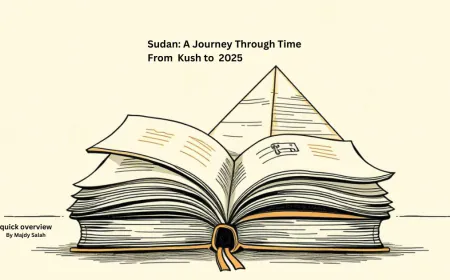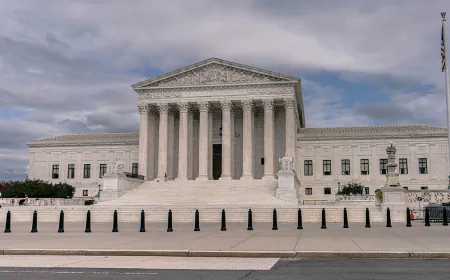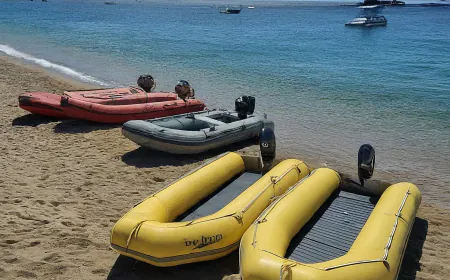Sudan: A Journey Through Time — From Kush to 2025
Explore Sudan’s history from ancient pyramids to modern conflict. Discover pivotal events shaping its identity and resilience.
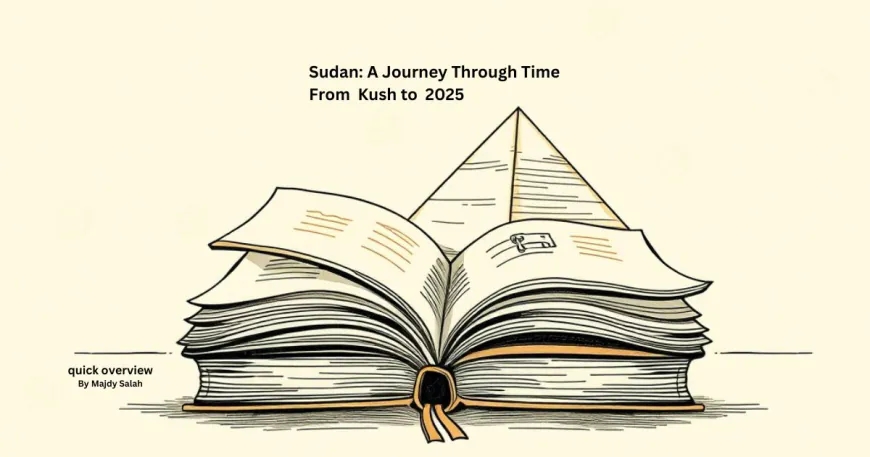
Have you ever imagined standing before pyramids older than those of Egypt? Or walking through streets that witnessed the rise of a civilization that once ruled the Two Niles? Sudan, a land of secrets and ancient civilizations, holds within its folds priceless historical and cultural treasures. Let us embark on a journey through time, unraveling the mysteries of this ancient land and exploring how historical events shaped its modern identity.
1. The Pyramids of Meroe: More Than Egypt!
While many believe Egypt is the only country with pyramids, Sudan actually has more pyramids than its northern neighbor! The Pyramids of Meroe, located in northern Sudan, stand among the nation’s most significant historical landmarks.
Source: UNESCO World Heritage Site UNESCO: Meroe Pyramids
2. The Kingdom of Kush: A Civilization That Ruled Egypt
The Kingdom of Kush was an ancient Nubian civilization that once ruled Egypt, leaving behind crucial historical legacies in both Sudan and Egypt.
Source: The British Museum Kingdom of Kush Archive
3. Ottoman Occupation and the Dawn of Challenges (1821–1885)
The Ottoman occupation of Sudan began in 1821 and lasted until 1885.
Sudanese people faced immense challenges, including exorbitant taxes and foreign interference.
The Mahdist State, led by Muhammad Ahmad al-Mahdi, emerged as a prominent resistance movement, achieving significant victories against Ottoman forces.
4. The Mahdist State: A Brief Period of Independence (1885–1898)
Established in 1885 after expelling the Ottomans.
Fell to British forces in 1898 after fierce battles.
Founded an independent Islamic state.
5. British Colonial Rule: The Era of Colonization (1899–1956)
British colonialism began in 1899 under the Anglo-Egyptian condominium.
The White Flag Society: Founded in 1923, this pioneering resistance movement was led by military officers Lieutenant Ali Abdel Latif, Lieutenant Abdullah Khalil, and First Lieutenant Abdel Fadil Almaz. It marked Sudan’s first organized nationalist opposition by armed forces personnel. The movement expanded as civilians joined its ranks, notably Obaid Haj Al-Amin, a dissident from the Sudanese Union League, who shifted tactics after recognizing the futility of peaceful opposition.
The Graduates Congress: Established on February 12, 1938, this organization emerged as a significant political and intellectual entity among Sudanese intellectuals. Ismail Al-Azhari, a key figure in Sudan’s independence movement, served as the first president of the Graduates Congress.
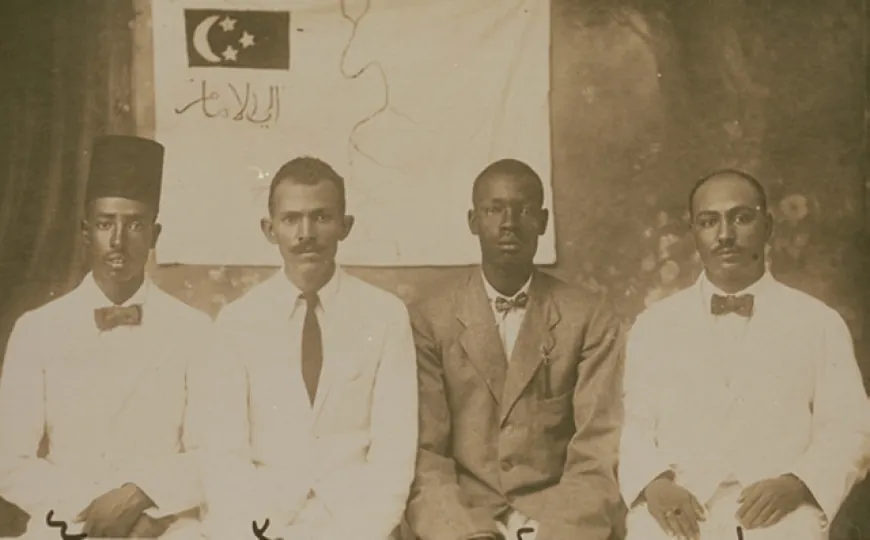
Leaders_of_the_White_Flag_league : From the right: Hussein Sherief, Ali Abdelateef, Salih Abdelgadir and Obeid Haj Elamin
Sudan gained independence on January 1, 1956.
A new era of hope for building an independent and prosperous nation.
Key figures of independence:
Sir Sayyid Abdul Rahman al-Mahdi (1st Chief Minister of Sudan, 1952–1953).
Ismail al-Azhari (1st Prime Minister of Sudan, 1954–1956).
Mubarak Zarouk served as Sudan’s first Foreign Minister in 1956, succeeded by
Mohamed Ahmed Mahjoub from 1956 to 1958.
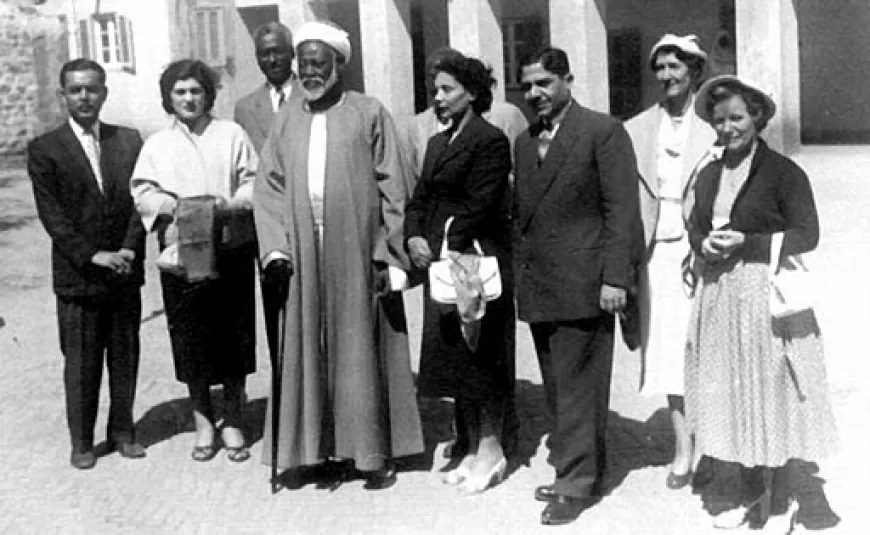
Sheikh Abdulrahman Mohamed Al Mahdi a Sudanese religious and political Leader with Judge Adi Bitar with his wife and Judge Daoud Abu Ghazaleh and his wife and others in Sudan
7. The Onset of Political Challenges
Post-independence struggles: Party conflicts and foreign interference.
British covert support for certain factions.
Sudan’s African Relations and Support for Liberation Movements
Played a pivotal role in supporting African liberation movements (1950s–1960s).
Provided diplomatic, military, and financial aid to Nelson Mandela’s ANC and the Algerian Revolution
Source: Article "Nelson Mandela in Sudan: Chronicles of a Historic Visit Al-Youm Al-Sabea
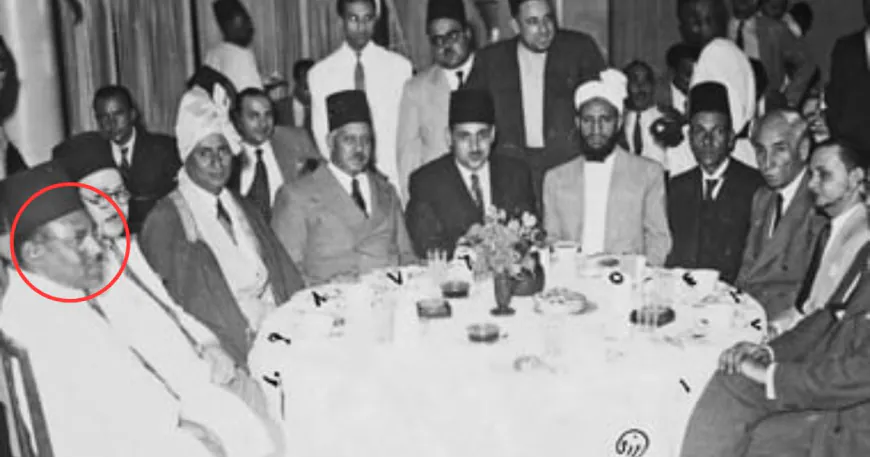
Ismail al-Azhari with others, A meeting of nationalist revolutionaries from the Muslim world. at a reception in the Continental Hotel in Cairo
Current Conflict: Challenges and Resilience (2023–2025)
As of 2025, Sudan remains embroiled in a devastating conflict marked by foreign interference, internal strife, and crimes against humanity. The ongoing battles between the Sudanese Armed Forces (SAF) and the paramilitary Rapid Support Forces (RSF) have drawn widespread condemnation for their brutality.
The RSF, responsible for systematic atrocities—including civilian killings, looting, arson, and kidnappings—has received direct military backing from neighboring Chad, the Central African Republic, Niger, South Sudan, Kenya, and Ethiopia. The United Arab Emirates (UAE) is the largest external supporter of the RSF, providing financial, logistical, and political assistance. This is substantiated by Sudan’s formal complaint to the International Court of Justice (ICJ), which includes irrefutable evidence of UAE involvement.
Despite these challenges, the SAF has demonstrated resilience, reclaiming strategic territories such as Khartoum Bahri (North Khartoum). As of Wednesday, Ramadan 26, 1446 AH (March 26, 2025), military analysts report the SAF is poised to announce the full recapture of the capital, Khartoum, within hours—a significant turning point in the conflict.
Key Developments:
Foreign Involvement: The UAE and regional actors are actively destabilizing Sudan by backing the RSF, undermining sovereignty, and prolonging violence.
Humanitarian Crisis: Over 10 million displaced civilians face acute shortages of food, water, and medical supplies.
International Response: The UN and African Union have called for sanctions against RSF leaders and their backers, though enforcement remains inconsistent.
Frequently Asked Questions
1. What are the top historical sites to visit in Sudan?
Sudan’s ancient wonders rival Egypt’s, yet remain refreshingly uncrowded. The Pyramids of Meroe—over 200 UNESCO-listed pyramids—are a must-see, offering a serene alternative to Giza. Don’t miss Jebel Barkal, a sacred mountain and temple complex once revered as the “Throne of Amun,” or the ruins of Napata, the spiritual heart of the Kushite Empire. Pro tip: Visit between November and February for cooler weather!
2. How has Sudanese music influenced global culture?
Sudan’s music is a rhythmic bridge between Africa and the Arab world. Genres like Al-Haqiba (traditional wedding music) and Al-Dalib (call-and-response folk songs) have shaped modern Sudanese pop and even inspired international artists. The hypnotic beats of Al-Tam Tam, performed with clay drums, echo Sudan’s Nubian roots. Fun fact: Sudanese jazz legend Sharhabeel Ahmed blends traditional rhythms with Afrobeat!
3. What role did Sudan play in Africa’s liberation movements?
As one of the first African nations to gain independence (1956), Sudan became a beacon of hope. It provided safe havens, military training, and diplomatic passports to leaders like Nelson Mandela (ANC) and Algerian revolutionaries. This legacy of solidarity is explored in our African Liberation Movements section.
4. Is Sudan safe for tourists amid its current conflicts?
While the 2023–2025 conflict has impacted parts of Sudan, ancient sites like Meroe and Karima remain accessible via guided tours. Always check travel advisories, avoid conflict zones, and prioritize local guides. Did you know? Sudan’s hospitality culture ensures warm welcomes even in challenging times.
5. How do Sudan’s ancient civilizations influence its modern identity?
From the Kingdom of Kush to the Islamic Mahdist State, Sudan’s past is etched into its present. The Nubian language, still spoken today, and the White Flag Society’s nationalist legacy (see British Colonial Rule) reveal a nation deeply connected to its roots. Explore more in our article Political Issues of the World
6. Why is the UAE involved in Sudan’s current conflict?
The UAE’s support for the Rapid Support Forces (RSF)—documented in Sudan’s ICJ complaint—reflects regional power struggles. Analysts cite interests in gold mining, agricultural land, and countering Turkish/Egyptian influence. For updates on Khartoum’s recapture, jump to our Current Conflict section.
Conclusion
Sudan’s story is one of endurance, from the grandeur of Kush to the trials of modern statehood. While its ancient pyramids stand as testaments to past glory, today’s battles underscore the fragility of peace in a region plagued by geopolitical rivalries. Lasting stability will require dismantling foreign-backed militias, accountability for atrocities, and inclusive governance.
Explore Further:
What's Your Reaction?









